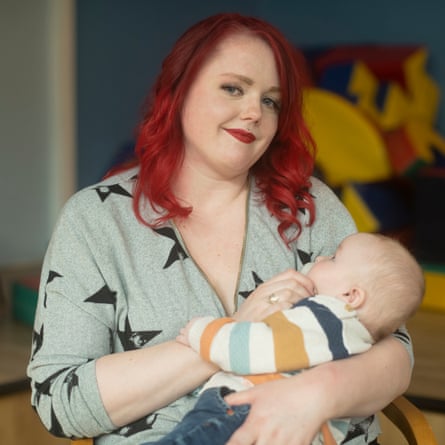When Bethany Morrall-Lane gave birth to her second son, she was so depressed and exhausted that one day, walking down the stairs carrying him, she thought: “If I tripped and fell, it would end it all now.”
Morrall-Lane was shocked by the thought. But she had other similar reflections, including planning which tree she would crash her car into the next time she was driving without her children.
“I struggled with my mental health and being a mum,” she says. “I just put it down to the baby blues, I hid it. I was afraid and ashamed. I had everything I ever wanted, but I wasn’t happy.”
While she was waiting to be alone in her car, a midwife told her about Mums Matter, an eight-week early intervention programme run by Mind Cymru equipping new mothers with tools to look after their mental health.
“By the time the course came around I had got to a dark place, but I was holding out hope it would help me,” Morrall-Lane, 33, recalls.
The course covers the importance of taking the time to look after yourself, accepting that motherhood is hard, learning to deal with negative thought patterns, and signposting where to get professional help if problems escalate.
It is accompanied by a peer group system, which forms networks of new mothers at a time many women find one of their loneliest. There is also a creche to give valuable space.
Morrall-Lane was sceptical – until the mothers started to open up about their own feelings. “It just felt so safe. It was the first time I felt I could be honest and not be judged for having intrusive thoughts or feeling I wanted to die. The fact there were other people going through that made me feel I wasn’t alone … it was totally life-changing.”
Morrall-Lane knew how to manage her moods, but she found the struggles of motherhood unique – particularly feeling that reality failed to match up to her idealised notion. She thinks that without Mums Matter she would not be here. The project’s evaluations suggest she is not alone.
Bethany Casey says: “I credit my life to them. I was consumed by really negative thoughts and dangerous thinking … I thought everyone would be better off without me.”
Casey, now 28, attended a psychiatric unit after giving birth and was prescribed medication for postnatal depression, which she found helpful. But she views the more pastoral and longer-term approach of Mums Matter as a vital complement.
Now, whenever she feels herself sucked into a negative thought spiral, she uses the cognitive behavioural therapy-style techniques she learned and turns to the WhatsApp group for support.
Casey gave up work and moved to a new area to have children, which left her feeling lonely and isolated. Mums Matter has given her a community and friends, while volunteering for the project gives her a sense of purpose.
Despite one in four mothers struggling with perinatal mental health, Tracy Lewis, a Mums Matter facilitator, says the mothers she works with feel their struggles go unrecognised, that there is limited support on the NHS, and they are reluctant to burden overstretched health workers.
At a time when preventive and early intervention services are being decimated across health and social care, Mums Matter makes a compelling case for their value.
The project has helped more than 400 mothers and is backed by early years funding streams in local authorities working in collaboration with the NHS.
Against a backdrop of rising maternal mortality in the UK and suicide becoming the leading cause of death for new mothers, NHS Wales established a perinatal mental health network in 2019, which identified a gap in services for mothers with mild to moderate levels of need, including depression and anxiety.
Martha Sercombe, the clinical lead for perinatal mental health at NHS Wales Executive, says: “The NHS wants to work far more preventatively, but because demand is so great at the other end, often we’re pulled in that direction.
“A lot of research supports the idea that if we invest in perinatal and infant mental health, we’ll have a really good return. Healthy, emotionally well parents who nurture their babies secure optimal brain development.”
She adds that NHS Wales is planning a public health campaign to encourage new parents to talk openly. “Parents are scared to share how they’re honestly feeling because they’re worried about being judged, or that professionals might feel they can’t look after their babies. It’s this personal stigma that’s still held strongly.”

This was the experience of Rebecca Hughes, 29, who joined Mums Matter feeling “really apprehensive because I don’t fit in with baby groups, and in general I feel like a bit of an outsider”.
She believes she would be on medication were it not for the project, which also helped her obtain a referral to therapy for her birth trauma and PTSD from sexual assault and abusive relationships.
“It’s not like a typical baby group where you can’t talk about normal things. It’s very uncensored, which I prefer because I’m autistic so I struggle with social cues. With people being a bit more real it’s helped me massively.”
-
International helplines can be found at www.befrienders.org. In the UK and Ireland, Samaritans can be contacted on 116 123 or email jo@samaritans.org or jo@samaritans.ie. In the US, the National Suicide Prevention Lifeline is at 800-273-8255 or chat for support. You can also text HOME to 741741 to connect with a crisis text line counselor. In Australia, the crisis support service Lifeline is 13 11 14.
#dark #place #NHS #project #helps #mothers #Wales #cope #life #birth #Mental #health
